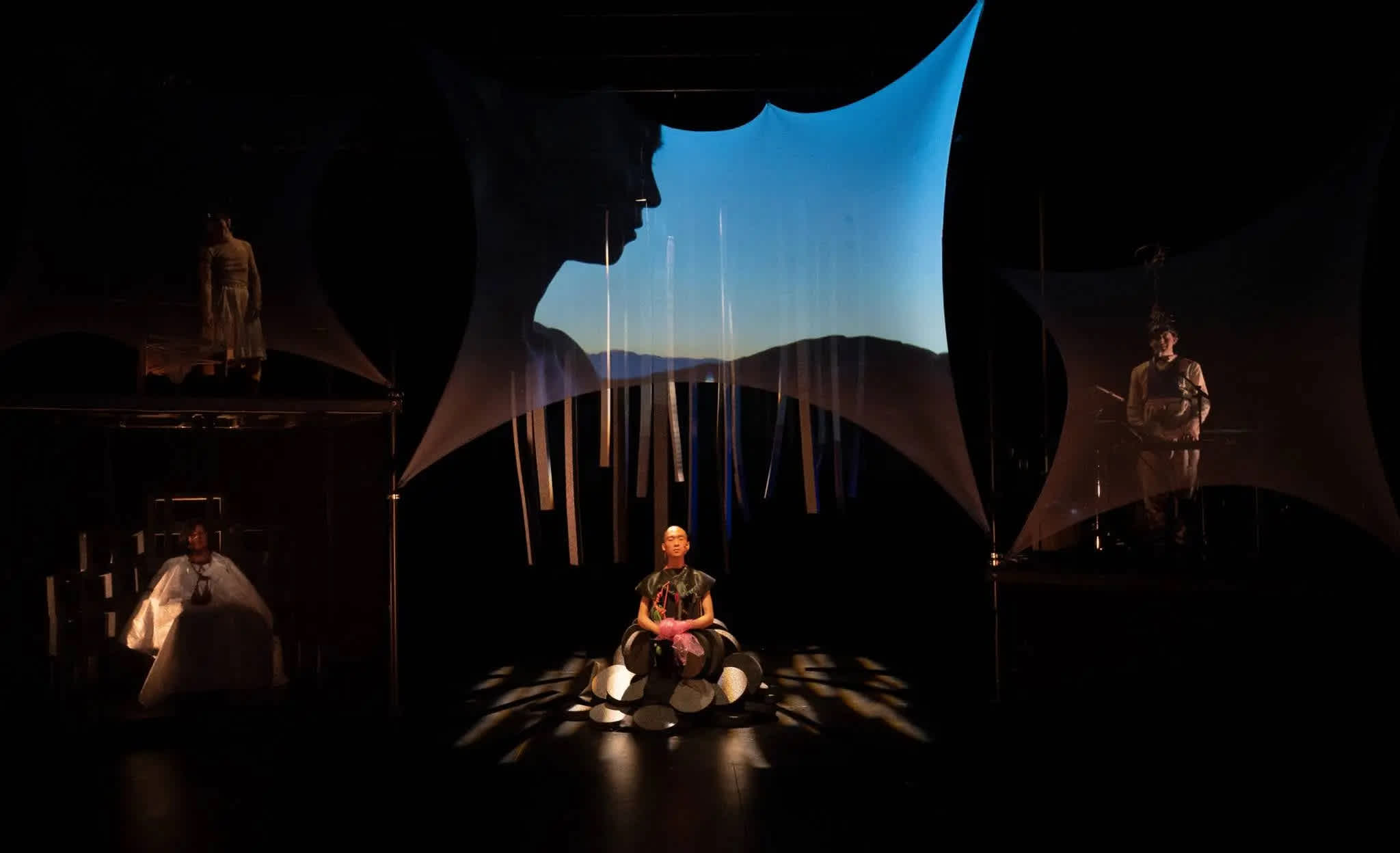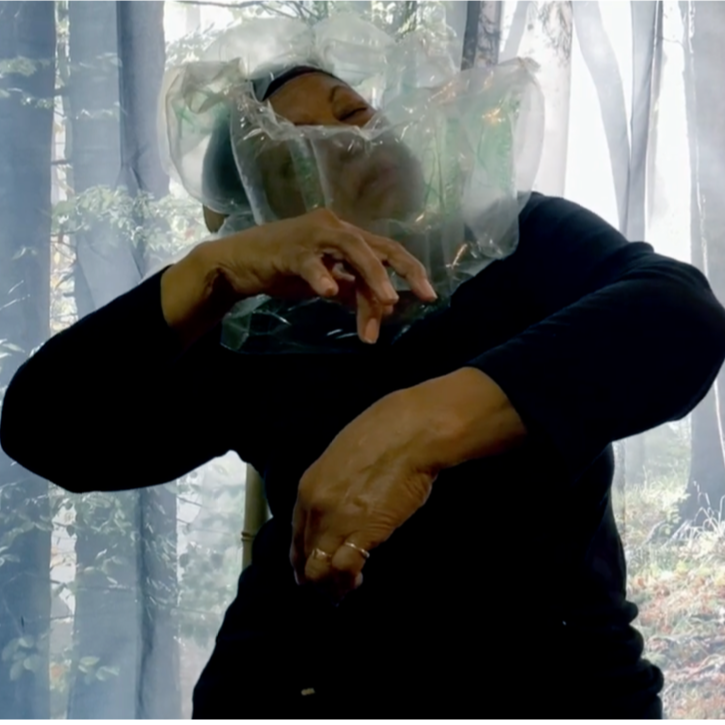
Juni One Set
Boy mother / faceless bloom is a stage work by Juni One Set, a collaboration of Senga Nengudi, eddy kwon, and Haruko Crow Nishimura & Joshua Kohl of Degenerate Art Ensemble. Threading mythology and autobiography, while drawing from the diverse lineages of queer, anti-colonial, and care-based artistic practices. Dance, music, poetry, ritual, and sculptural installation converge to tell a story of transformation, transgression, and the formation of new trancestral lines.
Schedule

Boy mother / faceless bloom
boy mother/faceless bloom is an interdisciplinary work encompassing dance, music, poetry, ritual, and sculptural installation to tell the story of a young boy who learns he will be a mother. It is the collective creation of Senga Nengudi with composer and violinist eddy kwon, dancer Haruko Crow Nishimura, and sound designer Joshua Kohl. Staging and costumes are by Nengudi. Through close collaboration across generations, cultures, and disciplines, Juni One Set produce a space of intuitive play for the expression of transgender identity, parenthood, and ancestral lineage against legacies of colonialism and the looming planetary crisis.
Juni One Set is the most recent iteration of Nengudi’s collaborative method. Collaboration has been a defining aspect of Nengudi’s work since the 1970s. Her generative partnerships have included the legendary Los Angeles collective Studio Z (with artists Franklin Parker, Houston Conwill, Greg Edwards, David Hammons, and Barbara McCollough, among others); an unofficial quartet with Conwill, Maren Hassinger, and Parker; regular collaborations with the Rudy Perez Dance Troupe; as well as with avant- garde dancers and musicians Butch Morris, Cheryl Bans-Smith, Yasunao Tone, and Blondell Cummings.
This New York premiere of Boy mother / faceless bloom is presented by Dia Art Foundation and New York Live Arts. The work is presented in conjunction with the long-term exhibition of Nengudi’s work on view at Dia Beacon, as part of Performa Biennial 2023.
About Juni One Set
Dia and New York Live Arts present the New York premiere of Boy mother / faceless bloom, a stage work by Juni One Set, a collaboration of Senga Nengudi, eddy kwon, and Haruko Crow Nishimura and Joshua Kohl of Degenerate Art Ensemble. The work is presented in conjunction with the long-term exhibition of Nengudi’s work on view at Dia Beacon, as part of Performa Biennial 2023.
Threading mythology and autobiography, while drawing from the diverse lineages of queer, anti-colonial, and care-based artistic practices, Boy mother / faceless bloom is an interdisciplinary performance work. Dance, music, poetry, ritual, and sculptural installation converge to tell a story of transformation, transgression, and the formation of new trancestral lines.
The piece premiered at the Fine Arts Center at Colorado College, Colorado Springs, on February 24, 2022. Juni One Set is the most recent iteration of Nengudi’s collaborative method. Collaboration has been a defining aspect of the artist’s work throughout her career. Her creative partnerships have included the Los Angeles collective Studio Z (with artists Franklin Parker, Houston Conwill, Greg Edwards, David Hammons, and Barbara McCullough, among others); an unofficial quartet with Conwill, Maren Hassinger, and Parker; the Rudy Perez Dance Troupe; and avant-garde dancers and musicians Cheryl Banks-Smith, Blondell Cummings, Lawrence “Butch” Morris, Yasunao Tone, and Kaylynn Sullivan Twotrees, among others.
Originally trained as a dancer, since the 1970s Nengudi has developed a distinct body of performance work spanning interactions with her sculptures, score-based actions, and choreographed events to be variously staged in interstitial urban spaces, dancehalls, or traditional theaters. She also creates stage and costume designs for the intergenerational, multidisciplinary cast with whom she collaborates, as is the case for Boy mother / faceless bloom. __ Degenerate Art Ensemble__ (DAE) was founded in Seattle in 1999 by dancer Haruko Crow Nishimura and sound designer Joshua Kohl. Through their concerts, dance and theater projects, and experimentations with public spaces, DAE reinvigorates and transforms the relationship between performer and audience, and challenges perceptions of music, theater, and dance. The ensemble has performed throughout the United States and Europe, including at the Frye Art Museum, Seattle; Yerba Buena Arts Center, San Francisco; and Festival of Contemporary Dance, Mexico City. They are recipients of the Artist Trust’s 2020 Arts Innovator Award and have received support from Creative Capital, MAP Fund, and New Music USA. DAE is based in Seattle.
eddy kwon was born in Minnesota in 1989. She is a violinist, vocalist, and performance artist whose practice combines composition, improvisation, movement, and ritual to produce spaces of transformation and transgression. kwon has performed internationally, including at the Kennedy Center, Washington, D.C.; Big Ears Festival, Knoxville, Tennessee; SESC Pompéia Factory, São Paulo; Barbican Centre, London; and more. She has received numerous awards and recognitions, including the Foundation for Contemporary Arts Robert Rauschenberg Award in Music/Sound, Arts Fellow at Princeton University’s Lewis Center for the Arts, and Andrew W. Mellon Artist-in-Residence at the Fine Arts Center at Colorado College, Colorado Springs. kwon lives in Brooklyn.
Senga Nengudi was born in Chicago in 1943. Her work spans sculpture, performance, photography, drawing, and poetry. She completed a BA in fine arts with a minor in dance in 1966 and an MFA in sculpture in 1971, both at California State University, Los Angeles, and spent the year between her undergraduate and graduate studies enrolled at Waseda University, Tokyo. Her foundational training in dance included classes in the Horton technique in Los Angeles and in Kabuki theater in Tokyo. While a student, Nengudi served as an educator at the Watts Towers Art Center with artist Noah Purifoy and at the Pasadena Museum of Art (now Norton Simon Museum), where early Happenings took place. In 1977, Nengudi’s first solo exhibition was presented at Just Above Midtown gallery, New York. In 2019–21, a retrospective of her work was co-organized by the Lenbachhaus, Munich, and Museu de Arte de São Paulo, and traveled to the Denver Art Museum and Philadelphia Museum of Art. She was awarded the Nasher Prize in 2023. Dia’s engagement with Nengudi began in 2017 with an invitation to participate in the institution’s long-running Artists on Artists Lecture Series and continues with a long-term presentation of her work at Dia Beacon, which opened in February 2023. Nengudi lives in Colorado Springs.
Supporters
Boy mother / faceless bloom is a National Performance Network (NPN) Creation & Development Fund Project co-commissioned by Colorado College in partnership with Contemporary Art Center Cincinnati, and NPN. The Creation & Development Fund is supported by the Doris Duke Charitable Foundation, the Andrew W. Mellon Foundation, and the National Endowment for the Arts (a federal agency). For more information, visit www.npnweb.org.
This project is supported by the National Performance Network (NPN) Documentation & Storytelling Initiative. For more information: www.npnweb.org.
Boy mother / faceless bloom was made with financial and residency support from BASE Experimental Arts (Seattle) and Roulette Intermedium (Brooklyn).
Production
Created, Directed, and Performed by Juni One Set with production from Degenerate Art Ensemble Production Team
Co-creator, sculptural & costume design, movement: Senga Nengudi Co-creator, music, movement: Eddy Kwon Co-creator, movement, music: Haruko Crow Nishimura Co-creator, music, sound design, stage design: Joshua Kohl
Lighting Designer: Jessica Trundy Projection Designer: Leo Mayberry Video Editors: Ian Lucero and Leo Mayberry Cinematographers: Ian Lucero and Leo Mayberry Photography: Bruce Clayton Tom
Music: Tomeka Reid and Jean Cook Costume Designers and Fabricators: Willow Fox, Aaron Graves, and Evelyn Bittner
This production is being documented by Ian Lucero (video) and Bruce Tom (photography) with the support of the NPN Documentation and Storytelling Fund.

